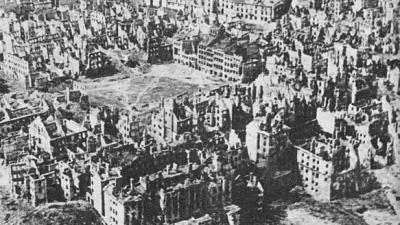In 1939, Germany was not planning an ordinary war. The aggression against Poland was to be a prelude to the total annihilation of the Polish nation. The Führer of the German state and nation, Adolf Hitler, on 22 August 1939, at Obersalzberg, left no doubt regarding this issue. It was when he gave the last briefing to the Wehrmacht High Command before the German Reich attacked Poland. The German leader had already been absolutely certain that he would not have to fight a two-front war at this stage of the conflict. The Reich's Foreign Minister, Joachim Ribbentrop, had been already preparing to fly to Moscow the following day to sign a 'non-aggression pact' with his Soviet counterpart, Vyacheslav Molotov. The pact was to become a de facto death sentence (contained in the famous secret protocol) for Poland and the whole of Central Europe.
Confident in the support of another totalitarian power, Hitler, speaking to a trusted audience, revealed to his generals in all sincerity that the German army attacking Poland should be guided by what he alluded to saying ‘The destruction of Poland is very much in the foreground. The aim is the elimination of living forces, not the achievement of a definite line. [...] Let no sympathy enter your hearts. A brutal procedure. 80 million people must be given their rights. Their existence must be guaranteed. The stronger has the right. The greatest ruthlessness. Genghis Khan slaughtered millions of women and children with full knowledge and joy in his heart, and history sees him only as the founder of a great state. I could care less what the weak civilisation of Western Europe will say about me".
The German generals and soldiers, as well as all other services and agencies of the German state after 1 September 1939, fully complied with the directives of their leader. The Second World War unleashed by Germany and the Soviets was, in fact, an attempt to destroy the Polish nation completely, in a biological sense. The German occupation lasting from 1939 to 1945, in the areas directly incorporated into the German Reich, in the General Government, and in the Polish territory which was occupied by the Soviets after 17 September 1939 (only to come under German occupation after 22 June 1941, up to 1944), cost the lives of almost three million Polish citizens. The German authorities were particularly ruthless in exterminating the Polish elite from the first weeks of the occupation.
The genocide in the Polish territories occupied by the German state began even before the German Reich set in motion the genocidal machinery of extermination of Jews (the majority of Polish Jews perished in the Treblinka, Belzec and Sobibor extermination camps of Operation Reinhardt in 1942). Its victims were representatives of the Polish elite. The Pomeranian massacre, the Tannenberg operation, and the AB operation in 1939-1940 were where German state functionaries and German neighbours (cf. the participation of the German self-defence unit in the Pomeranian massacre) practised crossing successive bloody Rubicons. There, they learnt how to murder thousands of defenceless, naked people (the Piasnica forests).
Consequently, we, as a state and nation, were deprived of our capacity for development for years. The chains of continuity of Polish intelligentsia were broken. Professors, teachers, judges, and landowners who perished as a result of the German state's policies were no longer able to produce their own children and students. These are irreparable losses for which no amount of reparation can compensate. Therefore, in our discourse on reparations, it must be emphasised that the report on reparations presented by the Polish government speaks only of symbolic reparations. No amount of money can make up for the fact that the German state denied us the opportunity to develop for many decades. In addition, there is the organised and systematically expanded mechanism of economic exploitation of our territories by the German Reich. The expropriations of Polish property and industry undertaken by the Germans were equal in scale and brutality to those organised by the Soviets after 17 September 1939.
The legal continuation of the German Reich, which ceased to exist in 1945 (the constitution adopted in 1919 did not formally cease to be in force in Germany after 1933), is the Federal Republic of Germany, established in 1949. This is the official legal doctrine of our western neighbour, formulated more than once by the Federal Constitutional Court in Karlsruhe (to present one example, in the 1970s, on the occasion of a challenge to the border agreements with Poland, among other states, which were concluded by the government of Willy Brandt). At present, Germany has adopted a position on reparations owed to Poland that can be summarised as ‘there is no issue, because, after all, Poland has long since renounced reparations’.
This stance is based on the thesis that reparations were renounced on behalf of Poland by the communist authorities imposed on us after 1945. However, the document in which the Bierut government supposedly renounced reparations has not been produced. The most important argument, however, is that the government of the Polish People's Republic was not sovereign as it was a Soviet vassal. It renders any renunciation a forced declaration and, therefore, invalid. This was already stated years ago by the eminent legal scholar Prof. J. Sandorski of the Adam Mickiewicz University in Poznan.
It is also noteworthy that the Germans themselves have repeatedly expressed their conviction that the issue of reparations to Poland is open. Otherwise, in the autumn of 1989, Helmut Kohl's government would not have pressured Tadeusz Mazowiecki's government to renounce the reparations in exchange for a unified Germany's recognition of the Polish border on the Oder and Lusatian Neisse rivers.
The rules for the collection of reparations by Poland, as laid down at Potsdam in 1945 (after the final deliberations of the Big Three), assumed that the reparations would be paid to us by the Soviet Union. However, it was, in fact, Poland who subsidised these ‘reparations’ given that the Soviets plundered our coal deposits. Moreover, the assets exported from Germany by the Red Army included many that had belonged to Poland before September 1939 (e.g. railway rolling stock).
It should also be noted that the issue of reparations, recently taken up by the Polish government, raises objections from Berlin not only for moral reasons (a reminder that the Germans were mass murderers and robbers) but also for financial ones (the need to pay SYMBOLIC TRILLIONS). The reason is that the initiative deprives Berlin of an instrument of pressure which it has always used in its relations with Poland. It should be remembered that the demands for compensation were first made to Warsaw by the Germans at the beginning of the 21st century. They were formulated by various compatriot groups (usually politically linked to the Christian Democrats). The German government formally dissociated itself from them but did not completely reject them. It assumed that a possible change of position on this issue could be an instrument of pressure. After the publication of the reparations report by the Polish government, Berlin was deprived of the possibility of pressure or blackmail.
When addressing the issue of German reparations to Poland, and in particular, the reluctance of the German side to address it, it is also vital to consider the wider context. Recalling Polish demands for reparations [in the context of the German war and occupation of Polish territory by the method of "extermination" (Vernichtungskrieg), coupled with the German authorities' reluctance to enter into reparations negotiations] blatantly contradicts the image of contemporary Germany as a "humanitarian power". It is precisely this image of the 'benevolent hegemon' that has been a pillar of the soft power of the new Federal Republic since German reunification. Berlin's intransigence on the issue of reparations creates a serious dissonance.
Recently, a book by Leipzig University literary scholar Prof. Dirk Oschmann (Der Osten: eine westdeutsche Erfindung, Berlin 2022/The East: West German Invention), which analyses the reasons for the lack of internal German unification as a result of the 'colonial' policies of the 'West Germans' in the former GDR, points out that this is the aftermath of the persistent conviction in German political culture that the East (in this case the 'new Länder' in eastern Germany) is a cultural desert, something fundamentally inferior in terms of civilisation. The Polish reparations report disproves this German myth of the "wild East". The report recalls figures and facts that prove that the ‘German cultural nation’ (deutsches Kulturvolk) behaved during the Second World War not only as a nation of genocidaires but also as a nation of plunderers. How could it happen that a nation of ‘culture carriers’ (kulturträger) exported dozens of depots full of looted goods from this ‘barbaric East’ (from Warsaw alone)? Who knows if this is not the real reason for the German reluctance to address the issue of reparations.
However, it cannot be ruled out that after the Polish parliamentary elections in autumn, when a coalition of ‘reasonable people’ with ‘European values’ will come to power, the German government will attempt to perform some kind of ‘reparations gesture’. If it happens, it will allow the new government to establish its credibility in the eyes of the Polish public, the majority of which did not demonstrate any reluctance to address the reparations when voting in October 2023. The political calendar (elections to the European Parliament and local governments at all levels in 2024, and presidential elections in 2025) suggests such a possibility. However, even if this were to happen, it would only be a gesture to support those in Poland who believe that ‘the only way to Europe is through Germany’.
Text originally published in the Strategic Challenges Review, Fundacja Polska Wielki Projekt, Warsaw 2023: raport_SUWERENNOSC_ENG_interactive.pdf (polskawielkiprojekt.pl)
Read also
Does the European Union Contribute to Moral Growth? How to Find the Place Where We Can Stop?
What is the “moral growth” indicated in the title? When seeking an answer to this question, one certainly should reflect on a related term – “moral progress”.








Comments (0)